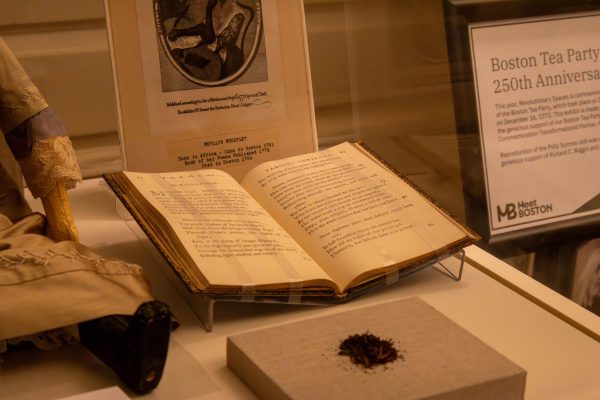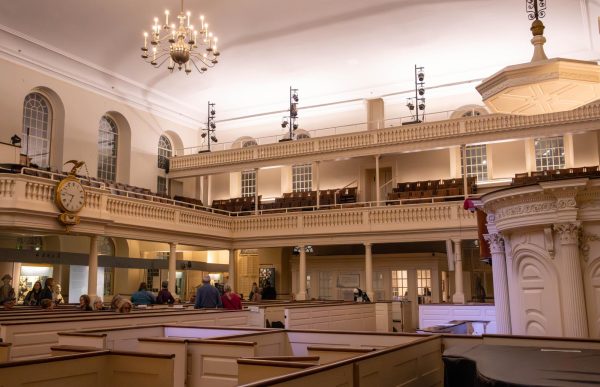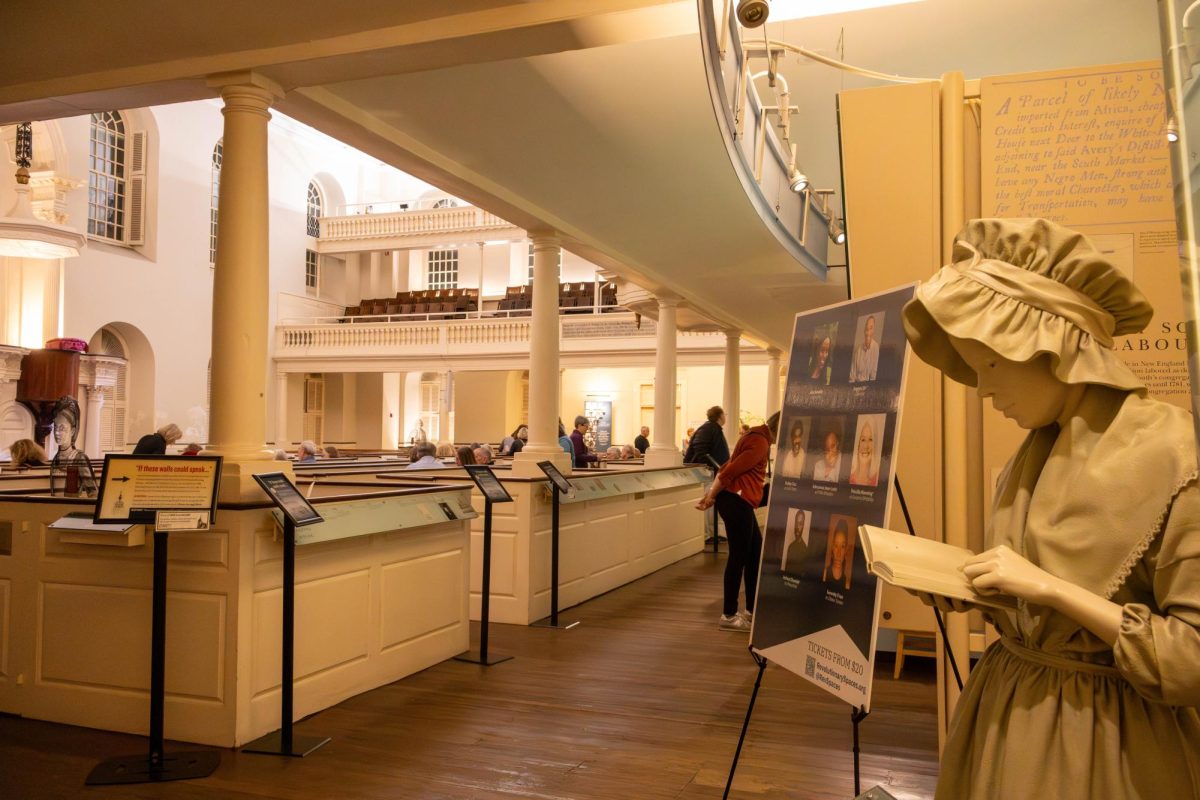The lights dim dramatically as the sounds of seagulls float over the audience and Phillis Wheatley, played by Adreyanua Jean-Louis, struts down the aisle exuding power and gracefulness.
“Phillis in Boston,” is a one-act play detailing the publication of famous author Wheatley’s collection of poems, exploring themes of racism, guilt and victory during her career. Written by award-winning playwright Ade Solanke and directed by Emmy-nominated producer Regge Life, a well-written script and site-specific staging supported the one-act play. The play ran from Nov. 3 to Dec. 3 at the Old South Meeting House.
Littered with historical facts, “Phillis in Boston” takes place in 1773 and follows Wheatley as she returns from her tour from London, hoping to begin circulation of her first book “Poems on Various Subjects, Religious and Moral.” However, it cannot be distributed because it is stuck on the Boston Tea Party ship, the Dartmouth, and the patriots refuse for any cargo to the leave the boat.
To help Wheatley retrieve the books, her friends Obour Tanner, played by Serenity S’rae, Prince Hall, played by Joshua Olumide, and John Peters, played by Bobby Cius, attempt to negotiate with the ship holders, patriots and dockmen. Wheatley refers to Tanner as her sister, showing the familial love between the two. Although Tanner and Wheatley are shown physically interacting in the play, historically Wheatley and Tanner only communicated in letters.
“I liked [the play] a lot and I liked that they brought together her friend, Obour, even though they had never met in real life,” said Dorothy Clark, an audience member at the play. “It was really cool to see them interact.”
Another obstacle that prevents Wheatley from properly retrieving her books is her former master, Susanna Wheatley, played by Priscilla Manning. Throughout the one-act, Susanna Wheatley continues to treat Phillis Wheatley like her personal servant despite buying her own freedom with the money earned on tour. Her demands almost prevent Phillis Wheatley from pursuing her career and lose her books in the process. Tanner encourages Phillis Wheatley to act independently and stop assisting Susanna Wheatley as if she were her servant. Phillis Wheatley slowly adapts a more individualistic mindset, embracing her newfound liberty and eventually turning down Susanna Wheatley’s requests to focus on her career.
This strength and passion is what pushes Phillis Wheatley to confront the patriots and eventually retrieve her books. Peters, Hall and Tanner were with her every step of the way to support her and celebrate the victory.

The play is presented at The Old South Meeting House, once a Loyalist and Patriot meeting house for mass public protests for the American Revolutions turned into a historical site museum. In the late 1700s, Phillis Wheatley was a congregant and member of the Old South Meeting House, attending parish meetings, pursuing the libraries and conversing with intellectual attendees. Watching the actors converse and perform with an air of familiarity adds another layer of historical ties and realism to the play.
“I did not realize her story intertwined so much with American history,” said audience member Gordon Willard. “To see the different perspective of free and enslaved African Americans at the time is very eye-opening.”
With a small cast of five members, “Phillis in Boston” keeps the audience engaged with interactive blocking. Actors walked up and down the aisles, sat in pews and even slept in them to add to the experience. It created an inclusive atmosphere, as if the audience were ghosts witnessing the events in real-time.
The play is an hour long. It is kept concise but explanatory, painting intricate details regarding the chain of events that lead Phillis Wheatley to eventually recover her books from the Dartmouth. An original copy of “Poems on Various Subjects, Religious and Moral” can be found on display, as well as notable past congregants of the Old South Meeting House who contributed to the American Revolution, such as Paul Revere.
“The books on the ship and the tea would have been dumped by the patriots trying to assert their own freedoms, liberty and hypocrisy that needs to be examined,” said audience member Lories Komlyn.
The play’s production ran until Dec. 3 and tickets were sold for $15 to $35. Upon arrival, audience members can listen to panelists detail Wheatley’s artistry in poetry or further discuss her lifetime of achievements, wander the museum and enjoy refreshments.
Wheatley’s work was groundbreaking and acted as a shining light on the intelligence and prowess of Black people, despite many colonists believing otherwise. It wouldn’t be for another 79 years after her death that the Emancipation Proclamation was signed. However, her poetry pioneered a path that reverberates throughout the world today in the form of Black expression.
“People do not acknowledge [the conflict] but it is educational and enlightening that we need to talk about more,” Komlyn said.














![A demonstrator hoists a sign above their head that reads, "We [heart] our international students." Among the posters were some listing international scientists, while other protesters held American flags.](https://huntnewsnu.com/wp-content/uploads/2025/06/image12-1200x800.jpg)



